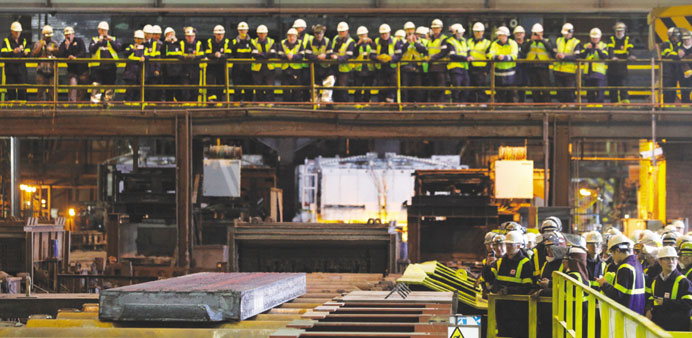Employees watch the first steel slab moving along the production line at the Sahaviriya Steel Industries (SSI) plant in Redcar, UK. SSI yesterday said it was halting operations at the Redcar plant as a sharp decline in steel prices had hurt its business.
Reuters/London/Bangkok
Britain’s second-largest steelmaker, SSI UK, said yesterday it was halting operations at its Redcar plant in northeast England, calling into question the future of its business and putting 2,000 jobs at risk.
The company, a unit of Thailand’s largest steelmaker Sahaviriya Steel Industries (SSI), said a sharp decline in steel prices had hurt its business.
Thai banking sources told Reuters that SSI has debts of about 47-48bn baht ($1.3 bln) related to its UK business and was negotiating with creditors on a debt restructuring, with talks expected to conclude next week. Media reports have said that SSI UK has missed several debt repayments.
“It is with great regret that we have had to make this announcement. Our decision follows a major deterioration in steel prices affecting our business during the course of this year,” Cornelius Louwrens, SSI UK’s business director and chief operating officer, said in a statement.
“We are taking this pause in production in order to re-evaluate and assess the situation following the outcome of ongoing discussions with our various stakeholders, including government and suppliers.”
Britain’s steel industry is in crisis, the government said on Thursday during a debate on the sector that followed reports of problems at SSI.
Producing steel profitably is difficult in Britain due to cheap imports and a strong currency, plus relatively high energy costs and “green” taxes imposed on heavy industry that are some of the highest in the world. The sector currently employs about 20,000 people directly, down from 200,000 in the 1970s.
The Redcar plant is located in an economically deprived region of the UK and locals fear permanent closure could put at risk thousands more jobs indirectly related to steelmaking.
“This is disappointing news,” British Business Minister, Anna Soubry, said after SSI’s announcement, adding government officials had met with SSI and union leaders. “The government stands ready to assist workers where needed,” she said.
“Government can’t fix the price of steel but we are doing what we can to help.”
Gareth Stace, director of UK Steel, the industry trade body, said the government was not doing enough.
“The time for warm words has passed,” he said. “We need a clear indication from government that it will honour its commitment to compensate steel and other energy-intensive industries from the cripplingly high cost of energy. Failure to do so could mark a potentially disastrous tipping point for the industry.”
Britain’s biggest steelmaker, Tata Steel, said in July it could cut more than 700 jobs as it had been hit by cheap imports and high energy costs.
SSI UK said discussions will be held as soon as possible with trade unions and employee representatives. It added it would retain the Redcar plant in conditions that would allow a restart “at an appropriate point”.
“This is devastating news. We will be seeking urgent talks with SSI management to find out the full extent of the impact this will have on both SSI employees and contractors,” said Roy Rickhuss, general-secretary of Community, a trades union.
Thai banking sources said SSI’s debts related to its UK business would have significant implications on the Thai banking sector if they are reclassified as non-performing loans.
In July, Krung Thai Bank, Siam Commercial Bank and Tisco Bank made extra provisions to cover increased risks related to syndicated loans of 44bn baht ($1.3bn) to SSI.
SSI bought the Redcar plant from Tata Steel in 2011, bringing cheer to locals as it revived 160 years of steelmaking.

